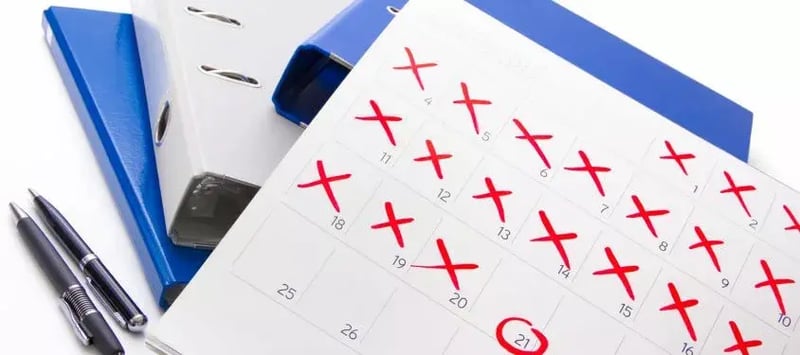Returned Direct Debits: What Happens If Your Direct Debit Bounced
by Marsh Finance on Aug 8, 2024 3:00:00 PM
Key Summary
A returned direct debit (dd) happens when there isn't enough money in your account to make the payment. This is an easy mistake to make, but it will likely affect your credit score if you continue to miss payments. You will know if a dd has bounced because your bank will usually reach out. At this point, you can move some money around to try and make the payment, but you may face late fees. Certain banks don't re-try direct debits, but for those that do, they will try at least once to reverse a bounced payment. If you're worried about missing a payment, consider the following:
- Set up direct debits three days after you've been paid.
- Create a warning system.
- Put some money aside for any emergencies.
Returned direct debit (dd) meaning: Returned direct debits, or bounced payments, happen when there isn’t enough money in your account; these can lead to unwanted fees.
Why Has My Direct Debit Bounced?
Is a Bounced Direct Debit a Bad Thing?
How Do I Know If My Direct Debit Has Bounced?
What Happens If a Direct Debit Bounces?
If a Direct Debit Is Returned, Will They Try Again?
How Many Times Is a Direct Debit Attempted?
.webp?width=600&height=400&name=Upset%20man%20holding%20credit%20card%20with%20laptop%20on%20background%20(1).webp)
Why Has My Direct Debit Bounced?
Most people use direct debits to pay car finance, mortgages, and other bills. Once they’re set up, direct debits give you peace of mind and the ability to sit back and relax, but things can go wrong if a payment bounces back.
The leading cause of returned direct debits is insufficient funds in your current account. This means that you don’t have enough money in your bank account to cover the payment – so it bounces back.
Key Points:
✅ A dd can bounce back if you do not have enough money in your account to cover the payment
✅ A one-off bounced direct debit is an easy mistake to make and easy to resolve without any long-term impact
✅ If your direct debits bounce frequently, your credit score may be impacted
Is A Bounced Direct Debit A Bad Thing?
It can be concerning when a direct debit is declined, but it’s usually not a big issue.
You may have made a simple mistake, or there have been delays outside your control. You may be able to move your money around to resolve this quickly. One or two bounced direct debits will likely not impact your credit score, and a simple phone call to the company you’re paying can sort things out.
If you’re a Marsh Finance customer and need help with a bounced direct debit, contact us.

How Do I Know If My Direct Debit Has Bounced?
Most of the time, your bank will notify you by email or text that a payment has bounced – but some banks may not contact you.
If you know that a payment is due to leave your account on a set date, quickly check to ensure the money has been transferred.
What Happens If A Direct Debit Bounces?
When your direct debit bounces, your bank will probably contact you to inform you, this will give you time to move money into your account and retry the payment. If your payment is retried and fails, your bank may stop and refuse to process the direct debit payment. If this happens, your bank may charge you a late fee.
Sometimes, you may be unable to access the funds you need to pay the direct debit. If this happens, we recommend contacting the company you’re trying to pay. The company may charge you a late or missed payment fee, but if you try to explain the situation, they may waive this altogether.
If you’re a Marsh Finance customer struggling to make your next payment, visit our money worries page to learn how we can help.
If A Direct Debit Is Returned, Will They Try Again?
It depends on your bank.
Some banks will try to process the payment again after it bounces. Most banks process direct debit payments early in the morning, but they may try again later in the day if a payment bounces.
How Many Times Is A Direct Debit Attempted?
Most UK banks will retry returned payments at least once, but some might retry the payment twice.
When opening a bank account, check with your chosen bank to see what their policy is for returned direct debits. They will explain the process to you and let you know of any fees you may incur if your direct debits bounce.

Can A Direct Debit Be Taken After The Agreed Date?
Yes. Weekends and bank holidays can push back direct debit payments. Most banks and companies will understand this and not charge you any fees.
If a direct debit is late due to your error, please get in touch with the company you are trying to pay. They may offer you an alternative payment date, breathing space, or a repayment arrangement.
Can I Avoid Bounced Payments?
Yes! If you’re worried about your payments bouncing, there are a few things that you can do to avoid it.
✅ Set up direct debits three days after you’ve been paid. This is a good idea as it’ll give you a buffer period if your money doesn’t reach your bank account when you expected it to.
✅ Set up a warning system. Ask your bank if they offer a warning system. Warning systems inform you if you do not have enough money in your account to cover future payments. They’ll get in touch and give you more time to move your money to cover your payments.
✅ Rainy day fund. While locking away your savings allows you to access better interest rates, it also means that you cannot access your money when you need it the most. We recommend having a small rainy-day fund in an easy-access savings account so that you can access the money if your direct debit fails.
Direct Debit FAQs
A bounced direct debit, also known as a failed or returned direct debit, happens when there isn’t enough money in your current account to cover a scheduled payment. This can lead to fees from your bank and potentially late fees from the company you owe money to.
The most common reason for a bounced direct debit is insufficient funds. This means you simply don’t have enough money in your account at the time the direct debit is scheduled to be collected.
One or two bounced direct debits are unlikely to cause any long-term problems. You can usually resolve the issue by contacting your bank and the company you owe money to. However, if your direct debits bounce frequently, it could negatively impact your credit score.
Your bank may notify you by email or text message if a direct debit bounces. However, this isn’t always the case. It’s a good idea to check your bank account balance regularly, especially if you have upcoming direct debit payments.
Your bank will typically try to process the payment again. If it fails again, they may charge you a fee. You should also contact the company you owe money to explain the situation and make alternative payment arrangements.
Some banks will retry a bounced direct debit once or twice. It depends on the bank’s policy.
Multiple bounced direct debits could negatively impact your credit score.
There are a few ways to avoid bounced direct debits:
- Set up your direct debits a few days after you expect to be paid. This gives you a buffer period in case of delays.
- Ask your bank about warning systems that notify you of low balances before a direct debit is due.
- Keep a small amount of money in an easily accessible savings account to cover unexpected shortfalls.
Lorem ipsum dolor sit amet, consectetuer adipiscing elit. Aenean commodo ligula eget dolor. Aenean massa. Cum sociis natoque penatibus et magnis dis parturient montes, nascetur ridiculus mus. Donec quam felis, ultricies nec, pellentesque eu, pretium quis, sem. Nulla consequat massa quis enim. Donec pede justo, fringilla vel, aliquet nec, vulputate eget, arcu. In enim justo, rhoncus ut, imperdiet a, venenatis vitae, justo. Nullam dictum felis eu pede mollis pretium. Integer tincidunt. Cras dapibus. Vivamus elementum semper nisi.
- Latest Car Updates & Advice (39)
- Car Reviews (24)
- Dealership Support (23)
- Industry Insights (20)
- Driving Test Advice (14)
- Car Insurance (8)
- Credit Score (8)
- Car Care & Maintenance (7)
- Car Tax (5)
- Christmas (3)
- Car Finance (2)
- Careers (2)
- Money Help (2)
- Company Updates (1)
- Partner Support (1)